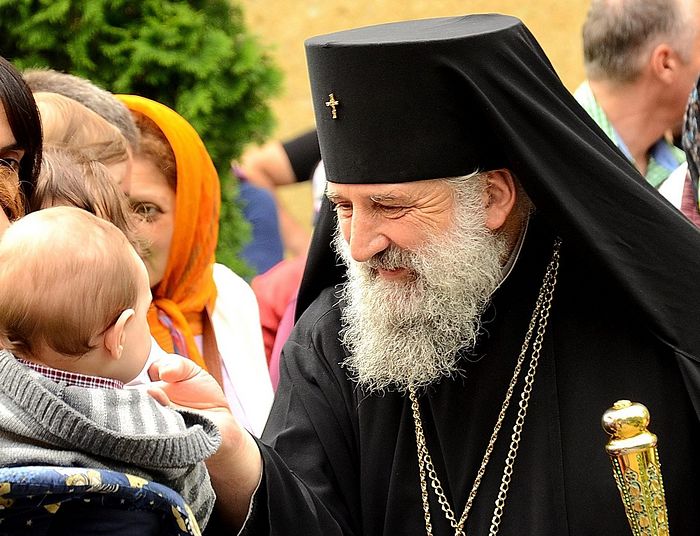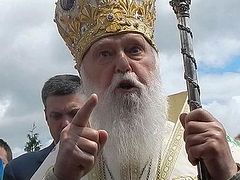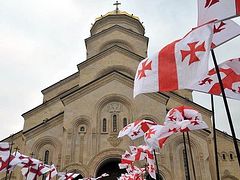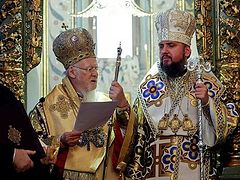Rustavi, Georgia, January 23, 2019
The development of events in the Ukraine are “an acute problem that has arisen in the world Orthodox Church,” with the canonical and majority Church being ignored and the situation being exacerbated by the statements and interference of political figures, His Eminence Metropolitan John of Rustavi of the Georgian Orthodox Church wrote on his Facebook page. His comments were also translated and published on the site of the Ukrainian Orthodox Church’s Department for External Church Affairs.
“The military confrontation between regions of Ukraine, which has been going on for more than 3 years already, should not develop into a religious confrontation of people confessing one faith. The common concern of the world Orthodox Church is the preservation of the unity of the people of the same faith. The statements and declarations of the private views of politically-biased people makes it difficult to maintain a healthy position,” the Georgian hierarch writes.
The head of the Georgian Patriarchate’s press service Archpriest Andria Jagmaidze expressed the same concerns yesterday, noting that there is increasing pressure on the Church from governmental and non-governmental factions to recognize the new Ukrainian nationalist church.
The metropolitan also recalls that the canonical framework of the Orthodox Church was formulated by the great Ecumenical and Local Councils of the 4th to 8th centuries: “The resolutions of these Councils clearly define the relationship to schismatic groups and to those excommunicated from the Church. The norms of their return to the bosom of the Church are also defined. These canons are based on the holy Gospel and Apostolic Tradition.”
And Met. John continues: “The hierarchs of the global Church remember how in the 1990s they negatively assessed the separation from the Mother-Church of the former Exarch of Ukraine Metropolitan Philaret.”
The official documentary history of Philaret’s defrocking and anathematization, including Patriarch Bartholomew’s acceptance of his defrocking, can be read here. In 1997, Pat. Bartholomew also accepted the anathematization of Philaret Denisenko, acknowledging that the Russian Orthodox Church had “exclusive competence” to deal with the issue. It was only in April of last year that Pat. Bartholomew changed his mind and decided that he held exclusive competence. Accordingly, the Holy Synod of Constantinople unilaterally lifted the anathema against Philaret in October.
Unfortunately however, as the Georgian metropolitan notes, “the Patriarchate of Constantinople unilaterally and alone decided to grant the status of an autocephalous church to clergy who had been in schism for years.”
His Eminence Metropolitan Nikoloz (Pachuashvili) of Akhalkalaki, Kumurdo and Kari also recently stated that while the Georgian Church is in favor of Ukrainian autocephaly in principle, they cannot serve with anathematized and self-consecrated bishops. The Serbian and Polish Churches have expressed the same convictions.
Characterizing Patriarch Bartholomew’s actions as have so many others, Met. John adds: “The unity of the Orthodox Church is based not on the sole, Papist principle, but on conciliarity, which is reflected in the Nicene Creed.”
The Georgian Church posted a statement in late September saying that the situation in Ukraine is very delicate and thus it needed to be worked out between the Patriarchates of Moscow and Constantinople—not unilaterally.
Met. John also notes, again, as have so many others, that the conditions stipulated in the tomos granted to the new Ukrainian church by Patriarch Bartholomew on January 6 are actually more consistent with autonomy than autocephaly.
He also laments that the tomos is silent about the fact that the majority of Orthodox Ukrainians remain in the Ukrainian Orthodox Church that is autonomous under the Russian Orthodox Church and who therefore represent part of the fullness of the world Orthodox Church.
“Therefore, we are guided by the principles of law and economia, so that the spirit of schism would not reign among us,” the Georgian hierarch testifies.
He concludes with a call to prayer: “Let us pray for the restoration of unity in the Ukrainian people, with whom we share the same faith.”
The Georgian Holy Synod has repeatedly said that it would wait to see how things develop regarding Ukraine before taking a position. Most recently, it announced in December that it would make a statement sometime this month about it. The Ukrainian outlet Cerkvarium reported on Monday that 10 of the 46 bishops have openly stated their support for Ukrainian autocephaly, though it is not clear if they are all speaking in principle or specifically about the new church.
While the Georgian Synod has not taken a formal stance on the issue, it is known that His Holiness Catholicos-Patriarch Ilia II strongly opposes Constantinople’s interference in Ukraine.
Follow us on Facebook!




